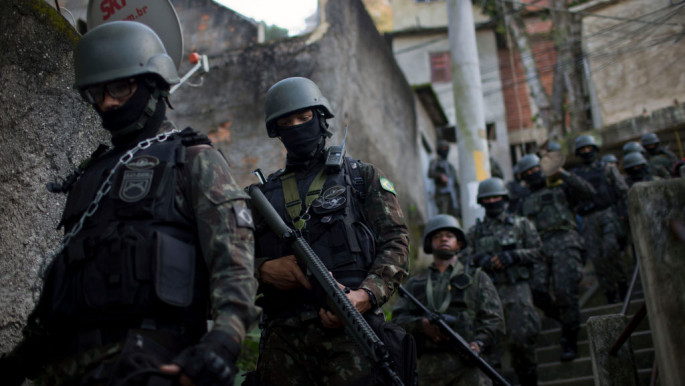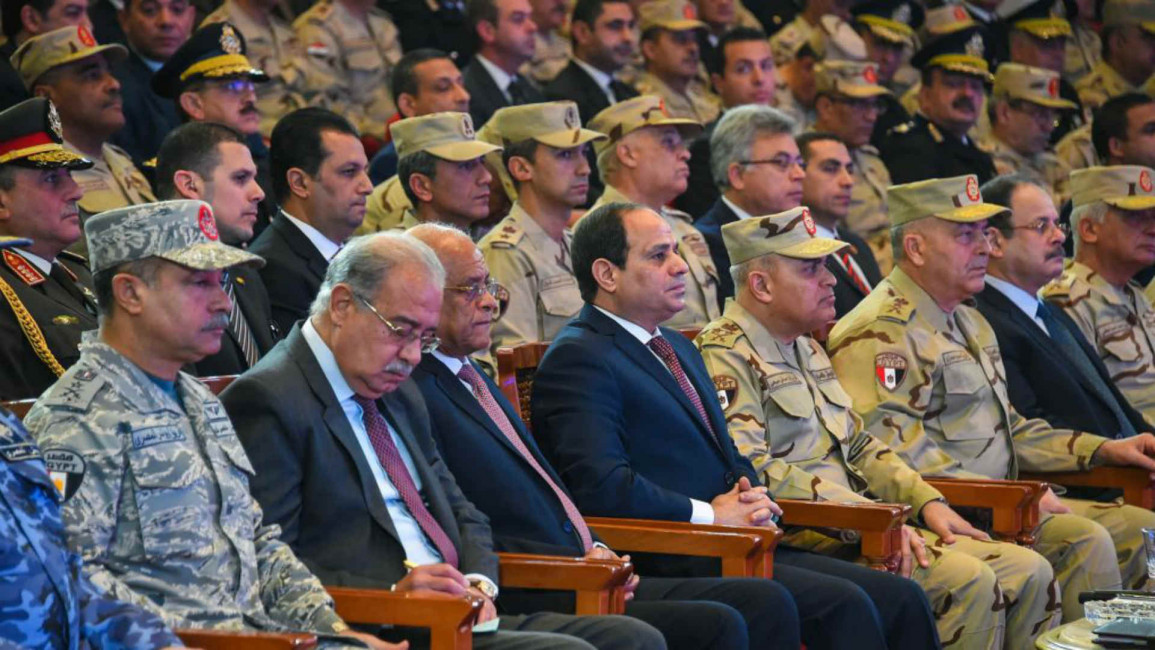
What Brazil can tell us about Egypt's civil-military relations
Brazil's people then began a campaign to roll back the military's prerogatives of rule that lasted more than a decade.
The country's long fluctuating civil-military political relations have provided a substantial empirical base upon which some of the most insightful studies of the general phenomenon have rested, including that by Alfred Stepan published in 1988.
A former Director of the Department of Defense's Center for Civil-Military Relations, Thomas Bruneau has recently drawn upon the 11 categories of prerogatives presented in Stepan's book to measure the Brazilian military's contemporary reassertion of power.
These two works provide a useful yardstick with which to analyse the Egyptian military's reassertion of power under President Sisi, as well as to compare it not only to Brazil, but to the relative political power of Egypt's military under Sisi's presidential predecessors.
In a nutshell, since seizing power in a coup d'etat in July 2013, the Egyptian military has established a maximum level of prerogatives along all eleven of the dimensions. The Brazilian military achieved such thoroughgoing control only at the height of its rule from 1969 to 1972, after which time its prerogatives began to diminish.
By these measures the contemporary Egyptian military is as politically entrenched as was its Brazilian counterpart during the period 1969-72, labeled by Stepan as one of "intense repression".
 |
The Brazilian military achieved such thoroughgoing control only at the height of its rule from 1969 to 1972 |  |
Assessing the Egyptian military's prerogatives separately makes possible comparisons between its roles under Nasser, Sadat, Mubarak, Morsi and Sisi.
On the first - "constitutionally sanctioned independent role of the military in the political system" - the 2014 constitution drafted under the military's tutelage granted it powers it had never previously, or only since 2012, enjoyed.
This included the power to declare war, to choose the Minister of Defense from among its ranks and to have him, rather than the president, serve as commander in chief, to approve its own budget, and to conscript Egyptians into its ranks, including those working in military companies at a wage of some $17 per month.
Read more: Can the Egyptian military regime implode?
The second prerogative, which is the "military relationship to the chief executive," similarly places the contemporary military at a higher level of control than that achieved under any of Sisi's predecessors, all of whom, other than Muhammad Morsi, were like him former officers.
But since 2014 the military has been elevated above even the officer-president, as it has been constitutionally empowered not only to choose its own minister, who serves as commander in chief, but to have more power over the decision to go to war than the president.
"Coordination of the defense sector" is the third prerogative, on which there is no major difference between the Nasser, Mubarak and Sisi eras, but under Sadat the presidency intervened more directly into defense policy and organisation, making the military's ranking on this prerogative at that time "moderate" rather than "high".
 |
|
| The Brazilian government routinely sends in army-backed police units to Rio de Janeiro's 'favelas' or slums. [AFP] |
Morsi sought to cultivate the military's support by giving it a free hand internally, although seeking unsuccessfully to harness it to his foreign policy objectives, probably resulting in a "moderate" ranking for the military during his presidency on this measure.
"Active duty military participation in the cabinet," the fourth prerogative, places the military under Sisi at the very highest level, in that his Minister of Defense must be drawn from active duty officers, whereas previously this and other ministerial portfolios could only be held by officers who had left the military. The proportion of former officers among ministers was, however, higher under Nasser than any time subsequently, but higher under Sisi than under Mubarak.
 |
'Active duty military participation in the cabinet,' the fourth prerogative, places the military under Sisi at the very highest level |  |
The fifth prerogative is "the role of the military vis-a-vis the legislature." Under Sisi the military not only selected the speaker of the parliament and its general secretary, but it organised the political parties that formed the majority, ruling coalition, in which a record number of retired officers serve.
Its National Security and Defense Committee, comprised almost exclusively of former officers, has under Sisi played a more prominent role than ever before.
Twitter Post
|
Nasser's, Sadat's, Mubarak's and Morsi's parliaments were filled with more active civilian politicians, with more substantial bases in civilian political parties, and were led by speakers supported by secretary generals more independent of the military than is the case with Sisi's parliament.
"The role of senior career civil servants or civilian political appointees" is the sixth prerogative. It refers to civilian representation in the ministry of defense.
For all presidencies in republican Egypt, including that of Muhammad Morsi, this ministry has been staffed virtually exclusively by officers. Since 2012 the number of officers appointed into ministries has been in the thousands, an even greater figure than under Nasser.
The seventh and eighth prerogatives are roles in intelligence and police, and here the trend line replicates a u-shaped curve, although higher at Nasser's end. Nasser placed his officer colleagues in charge of all military and civilian intelligence agencies, whereas Sisi has emphasised the role of his old satrap, military intelligence, along with that of General Intelligence, now headed by his former office director and colleague from military intelligence and in which his son serves.
But the renamed agencies State Security and State Security Investigations, which were built up by Mubarak as counterbalances to the military, remain under the Ministry of Interior, staffed principally by police rather than military officers, although both agencies have been more directly subordinated to the military than they were under Mubarak.
As for the police, since the Nasser era they have been indirectly influenced if not directly controlled by the military and staffed by officers who have passed through police, not military academies.
"Role in military promotions" is the ninth prerogative. Never have civilians played any part in recruitment or promotion of officers, although Sadat asserted more presidential control over the latter than did any other president. Morsi sought to have the ban lifted on recruitment of known Muslim Brothers into military academies, but his tenure was too brief for that step to be successfully implemented.
 |
The Brazilian military only achieved such far-reaching control over civilians at the height of its rule |  |
"Role in state enterprises" is the tenth prerogative, the trend line of which is again that of a u-shaped curve. Sadat civilianised many leading positions in state owned enterprises that Nasser had handed over to the military, some of which have been re-militarised under Sisi.
But a parallel phenomenon of the growth of the military economy has been on an upward trajectory since Nasser first founded it, then accelerating sharply under Sisi, with the military vastly expanding the number of companies it controls directly and indirectly and the number of its officers employed within them.
Read more: Egypt comes one step closer to total military control
Finally, "role in the legal system" traces another u-shaped curve, being high under Nasser, who created "revolutionary courts" under military auspices, and again under Sisi, during whose tenure the jurisdiction of military courts has been extended into civilian domains, the number of civilians tried in military courts vastly expanded, and the military rendered immune to civilian courts.
The civilian legal system has also been more directly subordinated to military control under the Sisi presidency, with a series of special courts having been created, the selections of judges on which are influenced by the military.
 |
The military is vastly expanding the number of companies it controls directly and indirectly |  |
Two conclusions can be drawn from this evaluation of civil-military relations in Egypt along these eleven dimensions.
The first is that the Egyptian military's domination of civilian politics is more durable and thorough than in Brazil or, for that matter, not only any other country in South America, but maybe also the world as a whole.
Second, the slight reduction in the military's overarching roles under Sadat, Mubarak and Morsi was due more to the assertion of presidential power than to the broader invigoration of civilian political life, although that did occur to some extent, especially in 2012-13.
The reassertion of the military's prerogatives under Sisi is due in part to that partial invigoration, which was perceived by the military as threatening.
It therefore moved to head off civilian control by staging a coup and re-imposing prerogatives that it had only partially surrendered under Morsi, Mubarak and Sadat.
If the Brazilian trajectory of civil-military relations is any guide to their future in Egypt, it suggests that any political victory by civilians over officers may well be partial, incremental and subject to reversals.
At present however, with the score on the game of control of the military being 11 for officers and zero for civilians, even a little victory seems to be in the distant future.
Robert Springborg is the Kuwait Foundation Visiting Scholar at Harvard University's Middle East Initiative, Belfer Center. He is also Visiting Professor in the Department of War Studies, King's College, London, and non-resident Research Fellow of the Italian Institute of International Affairs.
Opinions expressed in this article remain those of the author and do not necessarily represent those of The New Arab, its editorial board or staff.




